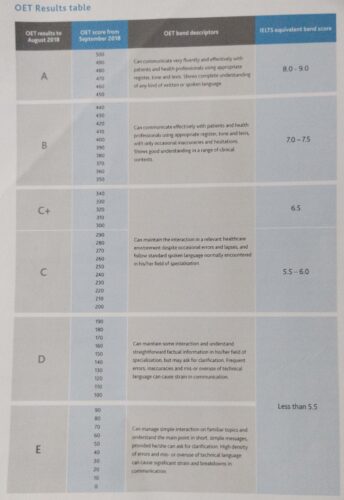If you are a health worker looking forward to migrate to an English-speaking country to further your education or continue health practice, then you must have a certification from a licensed English testing organization to prove your proficiency in the language.
If you have reached that crossroad where you get to choose the best English test most suitable for your pathway, then you must have learned of OET and IELTS.
These two tests are widely accepted by all the major English-speaking countries which are the most preferred destinations for all health workers globally; the United States, UK, Canada New Zealand and Australia.
In this post, we will be reviewing OET Vs IELTS, their difference, similarities and why you should choose OET as a health worker.
Who Should Take an English Proficiency Test?

All health workers looking to migrate and work in a country where English is the mother tongue of the locals and residents from a non-English speaking country or a country where English is neither their mother tongue or first language should take an English proficiency test. These tests are to ensure that you are capable of communicating in healthcare professional settings.
If you are coming from a country where English is your first language, you must endeavor to confirm from your test organization of choice whether you need an English proficiency certification or not.
OET Vs IELTS: Structure, Similarity, and Differences
OET stands for Occupational English Test. It is an international English language test that assesses the language proficiency of “healthcare professionals” seeking practice in an English speaking country.
As of the date this post was published, OET tests are strictly for the following healthcare professionals:
- Dentistry
- Dietetics
- Medicine
- Nursing
- Occupational therapy
- Optometry
- Pharmacy
- Physiotherapy
- Podiatry
- Radiography
- Speech pathology and
- Veterinary science
IELTS stands for International English Language Testing System. It is much broader than OET in the sense that it is a general English language testing system that could be taken by anyone irrespective of profession, and it is more widely accepted.
How Is OET Different from IELTS?
Structure of the Tests
Both OET and IELTS test candidates in 4 different language skills: Listening, Reading, Speaking and Writing. But the nature of the test is just slightly different.
Nature of OET
| Sub-test | Duration | Content | Shows Candidates can: |
| Listening | 45 minutes | 3 tasks Common to all 12 professions | Follow and understand a range of health-related spoken materials such as patient consultations and lectures |
| Reading | 60 minutes | 3 tasks Common to all 12 professions | Read and understand different types of text on health-related subjects |
| Writing | 45 minutes | 1 task Specific to each profession | Write a letter in a clear and accurate way which is relevant for the reader |
| Speaking | 20 minutes | 2 tasks Specific to each profession | Effectively communicate in a real-life context through the use of role plays |
Find out more about the nature on OET on their official website.
Nature of IELTS
| Sub-test | Duration | Content | Shows Candidates can: |
| Listening | 30 minutes | 4 recordings | Understand the main ideas and detailed factual information, the opinions and attitudes of the speakers, the purpose of utterance and evidence of your ability to follow the development of ideas. |
| Academic Reading | 60 minutes | 40 questions | Understand in detail the main points of the texts |
| General Training Reading | 60 minutes | 40 questions | Understand in detail the main points of the texts |
| Academic Writing | 60 minutes | 2 tasks | Able to identify the most important and relevant information and trends in a graph, chart, table or diagram, and to give a well-organised overview of it using language accurately in an academic style. |
| General Training Writing | 60 minutes | 2 tasks | Able to follow English letter-writing conventions, to use language accurately and appropriately and to organise and link information coherently and cohesively. |
| Speaking | 11-14 minutes | 3 parts | Able to speak at length on a given topic, using appropriate language and organising ideas coherently. |
Learn more about IELTS test on their official website.
OET Vs IELTS: Ease of Success
There is this popular opinion that OET is much easier for health workers to pass compared to IELTS.
Even though OET is more relatable to health workers since the tests are based on real life scenarios in the health workplace, it is best to view them from the standpoint of preparedness of the candidate.
Preparing well enough using the officially recognized test materials for either OET or IELTS is a sure guarantee for success.
Is OET easier than IELTS for doctors?
It is good that you also debunk the myth that OET tend to reduce the standard of the test since the test was designed specifically for health professionals. Every task you take in both tests will be scrutinized by a team of assessors who are professionals in the English language. So your best bet to succeed in the test is to prepare well and follow the official preparation guidelines as outlined by both organizations.
Furthermore, whether you are taking OET or IELTS, scoring below the expected band for any of the test skills implies that you need to retake the whole test including the skills you have passed previously.
So each skill component must be taken very seriously in order for you to achieve a complete success in IELTS or OET.
OET Vs IELTS Score

OET and IELTS have different scoring systems, but with designated equivalent band scores.
The pass mark in OET as required by most recognising and councils is a minimum of 350 out of 500 in each of the 4 subtests. This is equivalent to a minimum of grade B in each of the 4 subtests.
The pass mark in IELTS for most recognizing boards is a minimum of 7.0 in each sub-test, and an average of 7.5 in all subtest.
In terms of scoring, OET is a bit fairer when compared to IELTS as there is no need to reach a minimum average in all the subtests as long as you meet the minimum score of 350 in each sub-test.
OET VS IELTS Fees
The cost of booking OET is universal; $587 AUD irrespective of country. Each of the OET sub-test cost $193.50 AUD to book, with an additional booking fee of $7 AUD. Meanwhile, the cost of booking IELTS varies between $140 – $310 USD depending on the country of booking and your test centre.
This is nearly 3 times less than the cost used in booking for the OET exam, and explains why OET is the more popular option compared to IELTS.
The logic for most people is that even though OET is much easier to pass at one sitting, you must have written IELTS 3 times to get to the amount you used to book for a single OET.
But if you have the money, OET is the more straightforward and relatively easier option for health workers.
IELTS Vs OET Passing Rate
There is no pass or fail score in OET or IELTS. But depending on your profession and recruiting organization, you need to reach a cut-off point to be able to move on to the next level.
A survey released by OET in April 2020 revealed 73% of candidates who register for OET achieve the results they need to register with their licensing council in the UK.
OET Vs IELTS for Doctors and Health Workers: Why Choose OET?
1. Practicality
If you want to have a glimpse of what medical practice would look in the US, UK, Australia, Canada or New Zealand, then OET is the most logical choice to go for.
OET is way more practical as you will be learning from different health practice scenarios. The writing subtest will teach you how to construct an efficient referral letter, letter of discharge and transfer of care.
So apart from qualifying you to write your licensing exam, you will also learn how healthcare works in these places.
2. Easier to prepare
Because OET is more relatable, it is actually easier to prepare as the tasks are very similar to the scenarios you encounter daily in your health practice.
On the contrary, IELTS exam will test your knowledge and versatility in broader areas where you may have little or no knowledge of. This could result in exam shock for some persons who may be unfamiliar with the scenario in that context.
With the way OET is structured, it is very possible to prepare and pass the exam in your first sitting within 2 weeks to 30 days of solid preparation with the recommended preparation materials.
3. Further Learning
While preparing for OET, candidates come across many different new topics and concepts in health practice they may have had no idea of.
This increases your exposure, knowledge and confidence while interacting in your workplace. After taking the OET, you will find it a lot easier to adapt to the working environment in any of the countries you are travelling to.
Also, Read; How to prepare for IELTS Exam
OET or IELTS Frequently Asked Questions
Which Is Cheaper OET or IELTS?
IELTS is way cheaper than OET. OET costs $587 AUD while IELTS cost ranges from $140 – $310.
Is OET Easier to Pass?
Yes, OET is easier to pass when compared to IELTS. Also, the test day of OET is much more stress free compared to IELTS test day. OET takes just about 3 hours to complete all language skill tests and it has lesser tasks compared to IELTS.
IELTS on the other hand will take up to 5 hours plus to take on test day. It also has more tasks which some may find demanding. This however when viewed from a positive side will increase the chances you have to pass.
OET Exam Vs IELTS for PLAB
Both OET and IELTS are accepted by the GMC, the organization that is in charge of the PLAB exam for internationally trained doctors.
Which is better IELTS or OET?
For many people who are yet to decide which country they are travelling to, they prefer to take IELTS which is a more widely accepted test.
Is OET Easier than IELTS for Nurses?
Just like doctors, many nurses who can afford the cost of booking prefer to write OET instead of IELTS because it is more relatable and easier to prepare for.


